#Kapellmeister
Explore tagged Tumblr posts
Text

Bürgermusik Zell am See gegründet 1878
Kapellmeister: Prof. Josef Riedmann Obmann: Rudolf Berti
Salzburger Land - Austria
1 note
·
View note
Text

Erscheint demnächst:
Martin Knauer Georg Goltermann - Biographie eines vergessenen Komponisten und Kapellmeisters
Georg Goltermann steht in der Musikgeschichte des 19. Jahrhunderts in der „zweiten Reihe“. In seiner Zeit und bei seinen Zeitgenossen war er beliebt und sehr hoch geachtet. Doch nach seinem Tod im Jahr 1898 verblasste sein Ruhm sehr schnell. Allenfalls finden heute noch einige seiner Cellokompositionen Eingang in den Cellounterricht der unterschiedlichen Leistungsstufen. Von den acht Cello-Konzerten sind es die Konzerte Nr. 1 bis 3. Auch das 4. Konzert wird noch hin und wieder gespielt, da es auch von versierten Laien bewältigt werden kann. Die übrigen Cellokonzerte und die vielen Salonstücke sind mehr oder weniger in der Versenkung verschwunden.
Das Auffinden von Dokumenten aus seinem Leben und Schaffen – er gilt als der „Schweigsame“ unter den Komponisten und Kapellmeistern – ermöglicht nun einen guten Einblick in seine Zeit und kann frühere Urteile ins Positive wenden lassen. Vor allem die Orchesterwerke zeigen einen reifen Kompositionsstil, der seinen bekannteren Zeitgenossen ebenbürtig erscheint
erhältlich ab dem 15.08.2024 - jetzt vorbestellen
direkt beim Verlag (www.buch-und-note.de)
in unserem Online-Shop https://dkunert.de/Georg-Goltermann
in unserem Notenkeller in Celle (www.notenkeller.de)
bei jedem gut sortierten Buchhändler
Informationen zum Buch: https://www.musik-medienhaus.de/_bun/rubriken/buecher.html#0824-01 Informationen zum Autor: https://www.musik-medienhaus.de/_bun/personen.html
#buch#buchundnote#danielkunert#Buch und Note#Martin Knauer#Georg Goltermann#Goltermann#Biographie#Biografie#Kapellmeister#Musik#Komponist#Musikgeschichte#Orchester#Neuersch
0 notes
Text
Ardagger - Frühstücksnews - Montag, 4.3.2024
https://hannespressl.blog/wp-content/uploads/2024/03/dji_fly_20240303_144840_2_1709474756587_video-1.mp4 (c) Roland Forster Sehr geehrte Gemeindebürgerin! Sehr geehrter Gemeindebürger! Am Sonntag hat der Kulturverein Stift Ardagger (KIMSTÁ) seine Jahreshauptversammlung abgehalten. DANKE an Obfrau Birgit Weichinger und das Vorstandsteam für die exzellente Arbeit, die Du hier auf den Folien, die…

View On WordPress
#3-D#3-D Drucker#Amtsleiter#B119#Birgit Weichinger#Drohnenaufnahme#FLGÖ#Flugaufnahme#Franz Haugensteiner#Fußball#Hannes Dirnberger#Herrichten#Kapellmeister#Küche#Kimsta#Konzert#Kremslehner#Kulturverein Stift Ardagger#Musikverein#Musikverein Stephanshart#Obfrau#Purgstall#Reparatur#Reparaturbonus#Roland Forster#Silke Dammerer#Silvia Leitinger#Sperre B119#Spinning Wheel#Splitt Kehren
0 notes
Text
Vampire Salieri 🦇🩸


#mozart opera rock#antonio salieri#salieri#mor#mozart l'opera rock#vampire Salieri#vampire#vampire au#antonio salieri cosplay#salieri cosplay#kapellmeister salieri
59 notes
·
View notes
Text
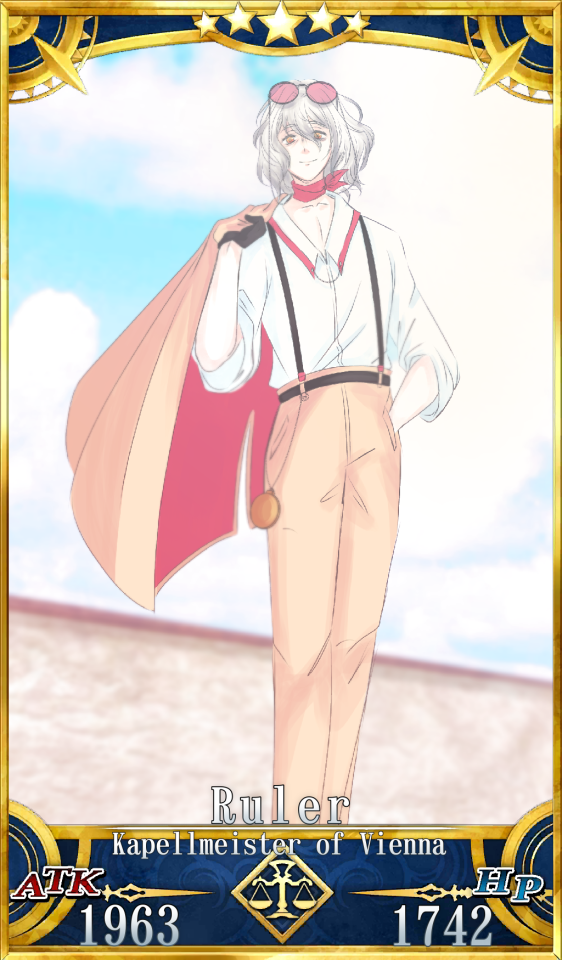

oh hey chat look who came home, a mysterious gentleman we meet during Vienna Singularity

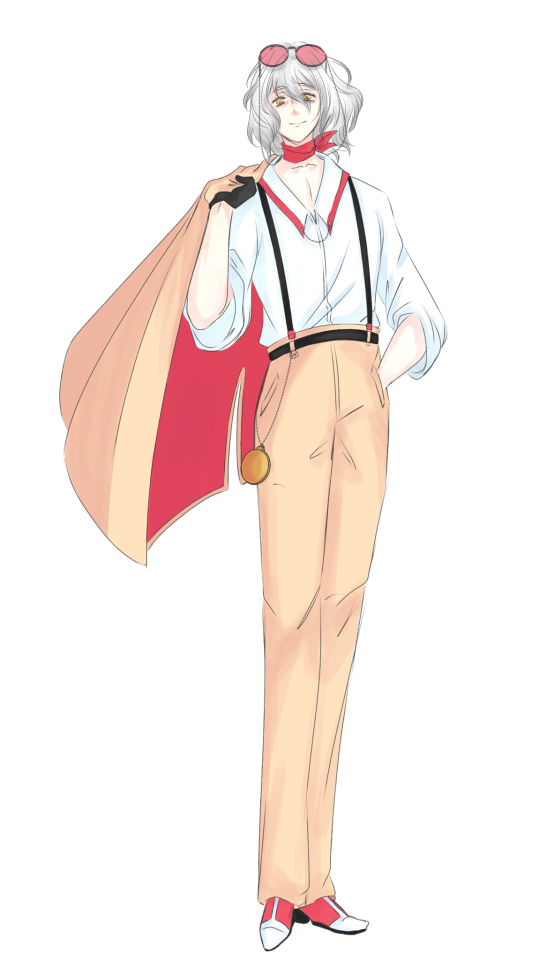
LMFAO I nearly died rip me I massacred him as well as ‘fake’ screenshots because NNNNNGH didn’t manage to find this in HD
ANYWAY let’s pretend there’s Vienna related singularity and we got yeeted here and mysterious signore is really insistent on being called Kapellmeister and being our local guide as well as main support servant
also count his existence similarly to Monte Cristo’s, which makes Ruler Salieri closer to his ‘when I was alive’ but also not quite, it’s complicated in a way. Despite everything he STILL considers Caster Salieri being closest iteration of irl Salieri, while also with some bittersweetness acknowledging Avenger Salieri and never denying his existence and rather opposite welcoming him, he’s middle ground
#fate grand order#fgo#antonio salieri#ruler salieri makes his return but now with more drip(??)#take this man away from my hands I’m in no way qualified to design#he’s vibin on summer vacation around Europe#the way entire story is spend with everyone knowing his true name yet he insists on being called Kapellmeister to avoid confusion#complications as well#ruler Salieri absolutely acknowledging existence of his other versions and accepting them all#I think while Dantes and Count will be constantly high key hostile with each other#Salieri and Kapellmeister quickly bond because they’re still too nice#*jumps into trashcan* LASAGNA I BEG FOR HIGH RARITY SALIERI GDI
26 notes
·
View notes
Note
what position would you have in a medieval court
OH i’d like to be a kapellmeister or something to do with music . honestly i’d be awful at all of them but i’d like to play a sad little jingle anytime someone declares war on my country . i don’t think this was an official role but i could also kill it as a divine prophet or something of the sort
#kapellmeister is like the guy who is in charge of all the court musicians#but the piano didn’t exist in medieval times so i would have a really hard time getting a job#i did a wikipedia search of different positions in medieval court they all sound like they suck#i don’t like to serve other people my whole life so i would probably get beheaded or something#<— i work in customer service#super trouper lights🕺#swanning about
3 notes
·
View notes
Photo
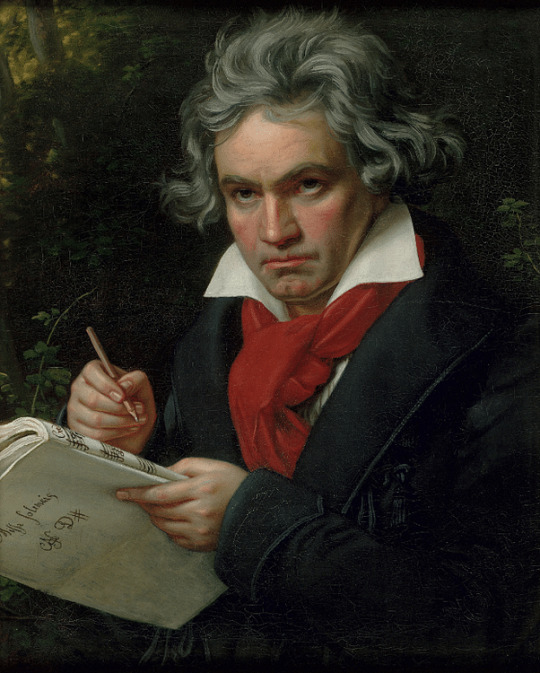
Ludwig van Beethoven
Ludwig van Beethoven (1770-1827) was a German composer of Classical and Romantic music; he is widely regarded as one of the greatest musicians to have ever lived. Most famous for his nine symphonies, piano concertos, piano sonatas, and string quartets, Beethoven was a great innovator and very probably the most influential composer in the history of music.
Early Life
Ludwig van Beethoven was born in Bonn, Germany, on 16 December 1770. His grandfather was the director of music (Kapellmeister) to the Archbishop-Elector of Cologne at Bonn and his father, Johann van Beethoven (c. 1740-1792), worked at the same court as both an instrumentalist and tenor singer. Ludwig's mother was a head cook in the palace. Ludwig had only two other surviving siblings, his younger brothers Caspar Anton Carl (b. 1774) and Nikolaus Johann (b. 1776). Ludwig's father was keen for Ludwig to develop his obvious musical skills but went rather overboard so that his eldest son spent so much time practising on the piano he did not have a lot of time left for all the other things children need to learn to become rounded adults. Johann was violent and an alcoholic, so there was not much that could be done against his wishes.
Ludwig's musical education continued at the Cologne court from 1779 under the tutorship of the organist and composer Christian Neefe (1748-1798). Ludwig impressed, and he was made the assistant court organist in 1781, and the next year, he was appointed the court orchestra's harpsichordist. Already composing his own pieces, Ludwig's work was catalogued by his teacher and a set of keyboard variations was published in 1782. Three of Ludwig's piano sonatas were published in 1783. In a smart move, Ludwig dedicated his sonatas to the Elector, and although he died that year, the next Elector saw fit to keep him on in the court orchestra.
In 1787, Ludwig was all set to go to Vienna where it was arranged he would take lessons from Wolfgang Amadeus Mozart (1756-1791). Although he made it to Vienna, when Ludwig's mother became ill, he was obliged to return home after only two weeks. Unfortunately, Ludwig did not manage to return to Bonn before his mother died, likely of tuberculosis. In 1789, Johann van Beethoven had descended deeper into alcoholism and grief so that Ludwig was obliged to take over responsibility for his family's affairs, which included controlling half of his father's salary. A second opportunity to learn from a master came in 1792 when Ludwig was given leave to study under Joseph Haydn (1732-1809), who was also in Vienna. The music of both Mozart and Haydn influenced Beethoven in the first stage of his career as a composer, as did the guidance of another teacher, Johann Georg Albrechtsberger (1736-1809), particularly regarding counterpoint.
Continue reading...
38 notes
·
View notes
Text
King Jérôme offers Beethoven a job
In 1804 [Beethoven] had been engaged as piano teacher by Archduke Rudolf, youngest son of the Emperor Francis; so began a friendship that often helped the increasingly discreet republican. In 1808 he received a flattering offer from Jérôme Bonaparte, king of Westphalia, to come and serve as Kapellmeister in the royal choir and orchestra at Cassel. Beethoven agreed to fill the post at six hundred gold ducats per year [...] When word spread that he was negotiating with Cassel, his friends protested against what they called disloyalty to Vienna; he answered that he had toiled there for sixteen years without receiving a secure position. On February 26, 1809, the Archduke sent him a formal agreement by which, in return for Beethoven’s remaining in Vienna, he would be guaranteed an annual sum of 4,000 florins, of which Rudolf would pay 1,500, Prince Lobkowitz 700, and Count Kinsky 1,800; in addition Beethoven might keep whatever he earned. He accepted, and stayed.
The Story of Civilization 11: The Age of Napoleon by Will and Ariel Durant, 1975.
#Beethoven's life#Bonapartes who patronized musicians#Paganini worked for Elisa Bacciochi#Jerome Bonaparte unintentionally helps Beethoven#what's the diff between a florin and a ducat
9 notes
·
View notes
Text
youtube
The Culmination of a Solemn Musical Triptych: A Critique of W.A. Mozart's Symphony No. 41 (Jupiter)
by @suigenerisstuff
In June 1788, the Austrian composer Wolfgang Mozart wrote the following letter to his friend and masonic brother, Michael Puchberg, from behind a newly won minor position, subordinate to the authority of Antonio Salieri's Kapellmeister at the court of Joseph II:
"I still owe you eight ducats. Apart from the fact that at the moment I'm not in a position to pay you back this amount, my trust in you is so boundless that I dare to beg you to help me with a hundred guilders until the next week, when my shows will start at the Casino."
This is just one of many indications of the idea of an economic failure that would haunt him throughout his life, as well as a mark in the construction of a historical persona of the 'eternal prodigy', always at the mercy of fraternal intervention and ready to live a bohemian, inconsequential life. This image, however - despite the indefensible impudence in life and the scatology left behind in his works - becomes increasingly false - as a persona should be - when we turn our imagination to that summer. In addition to his frequently affected health and mounting debts, we notice the absence of a main figure in his life: Leopold, a later frequent patient of musicologists and psychoanalysts, kept in limbo between a fierce disciplinarian of a shining musical power - almost a co-owner of other people's genius -and a calculating and opportunistic manipulator of his son's talents. This dichotomy allows us to return to Mozart's stylistic choices in his mature period, as well as the consequences for his finances and the legacy of his entire oeuvre. It is necessary, at this point in the reading, to beware of the anachronism of a historical excerpt in which the vast majority of public exhibitions of concerts and instrumental pieces took place in the midst of the effervescence of a court hall, that is, played in the midst of the libertinism of an audience that saw the orchestra as a secondary element of a larger event. In this conception, either numerosity or practicality became the rule for an artist's prosperity. Impunity would not come to the young man from Salzburg, and his father would soon warn him in 1778:
"If you don't have any students at the moment, then write more, even if you sell your work for a lower price; for God's sake, you need to make yourself known. But write something short, easy, popular. Ask a publisher they'd like - maybe easy quartets for two violins, viola and basso. Do you think you'd be demeaning yourself by doing things like that? Not at all […]"
The preoccupation nevertheless tested the musician through his commercial inabilities over the years, bringing out for many the most remarkable trait of the composer who, with a certain frequency, revisited the ideal balance between the pleasant and the disruptive, the first factor being defined by the cruel reality; he would not always be a composer, but also an entertainer, an agent of himself and, in some way, a man whose father would expect constancy and reverence for the Austrian tradition. The second, fatally influenced by Masonic and Parisian academics - like his contemporary Rousseau - would ensure that he "equated existential allegories with the destinies of psyches and societies thrown into change", in the words of Patrick Mackie. With this interpretation, in the summer of 1788, Mozart wrote his last three symphonies in less than two months, the functional examples of his zeitgeist. Especially the last one, the 'Jupiter' symphony, coined after the fact thanks to the opulence of the god who appears throughout the piece in heroic motifs, but which, in reflection of the time, crowns fluidity in balance, It has its own contrapuntal style built on the contrasting themes of the first movement - sonata-allegro - which develop and resolve in the recapitulation, followed by a lyrical andante cantabile with dramatic episodes, ending with the energetic character of a minuet and trio in the third movement, nostalgic for the explosiveness of the first. In the fourth movement we are faced with the most famous kaleidoscope of an era in transformation, the end of a great achievement from the perspective of a definitive enlightenment that would permeate the social and therefore cultural relations of this time as a fusion between harmonic manifestations and the construction of independent voices in a unique phrasing of the classical period.
#classical music#classical studies#fine art#classic literature#art#music#article#art critique#orchestra#mozart#symphony#classical musician#classical art#Youtube#academics#Aesthetic#academia#classic academia#uni#literature#college#english literature#autumn academia#dark acadamia aesthetic#romantic academia#light academia#academia aesthetic#dark academism
6 notes
·
View notes
Text
"startled and unnerved" - part 2 - 1782 (1)
part 1
---
Mozart’s arrival was light as the wind; unbearably so, and ringing with his high, blithe laughter. It whistled, waltzed through all that it came upon, and eventually crumbled against palace walls, uprooting nothing.
Unless somebody forgot to close the windows.
Or, in fact, the gates, through which Mozart came prancing, assured of his place here as (if more more than) any noble by birth.
If it had been unnerving to hear of his winsome escapades along the upper echelons of Viennese society— one that won him an opera commission not two months after the dissolution of his employment with Colloredo— then even more so was reports about the alarming speed at which he was actually completing the commission.
“You mean it is already in rehearsals?” Rosenberg said to Stephanie, with deep scepticism.
“Yes,” the harried librettist sighed, as if distressed, “and I’ve no doubt he’d be climbing my windows again to beg for corrections and additions, I’ve never worked with a more insistent, stubborn, flighty, bizarre…”
“Again?” Rosenberg suddenly gawped, “what do you mean again?”
“How is—” Salieri interrupted, his curiosity getting the better of him, “the rehearsal for the opera coming along? Is he as much as people say he is?”
Stephanie threw him an unreadable look.
“You’d better come see for yourself, then.”
~~~
A few days after this interlude, Salieri took ill.
He must have stood for too long in the wind.
Or more to the point, consecutive sleepless nights incurred a debt that must be repaid, regardless of how shameful the cause for his insomnia. He was in such a state of disquiet that even the Emperor took notice, and remarked curtly on his not being himself.
“Forgive me, your Majesty…” Salieri quickly bowed his head, “I do not feel very well.”
Joseph II waved him off, uncharacteristically nonchalant about whether Salieri was present at his evening chamber concert. Salieri paused momentarily, jarred by his swift dismissal, but neither was he too willing to question the Emperor. Thus he simply gathered his music, and turned to go. The other court musicians paid him no mind, rushing to cajole the monarch, and Salieri was readily forgotten.
In his mind, announcing his exit, there was a despicable, grating laughter; the mockery of heavens above, sounded in the basest of instruments. So distracted was he that Salieri did not notice the laughter was far from in his mind. Nor did he see the figure running down the hallway, and bodily collided with it at the door— he stumbled, inadvertently gripping the other’s shoulder to steady them both— then realized who the intruder was.
“Ah, Maestro Salieri!” cried an inappropriately exuberant voice. He laid a hand over Salieri’s, which jolted away as if burned.
“Mozart.”
Said man took a moment to consider him, then giggled to himself once more, seemingly over nothing. And Salieri could swear his headache intensified tenfold.
“Come in, Mozart!” Joseph II’s voice rang behind his back. There was no pointed statement about Mozart’s tardiness, or his plain disrespect of the Emperor for entering without being shown in, then stalling at the door without addressing Joseph II himself. “You are just in time to replace Signor Salieri for the evening, for our poor Kapellmeister is unwell.”
“Is that so?” Mozart turned to him. His expressive, guileless face took on a shade of concern, quizzical and extravagant as the wig on his head.
It may be an illusion of illness, that Mozart’s look appeared to Salieri sharp as a predator’s. Either way, he had no intention of continuing this encounter while he was so unsteady.
“If you’ll excuse me…” he began, pointedly in Italian, while the others spoke in German.
“Mozart, did you bring the music?” The Emperor called.
“Yes, your Majesty!” Mozart bounded forward, finally sensing Joseph II’s growing impatience, but doubled back once more. “Wait, Salieri— you’ve not returned the score to my opera! And I made no copy! Will you—”
Pretending to not have understood his rapid German, Salieri pushed past him.
“I must bid you goodnight, Signor,” he said, exaggerating the Legnago accent he’s not spoken with since he was a boy.
Mozart appeared a little confused, but eventually went on ahead towards the Emperor’s prized fortepiano. Salieri continued making his retreat. He didn’t need to look to imagine the sour expressions of musicians in the chamber. A cabal of jealous fools who ordinarily won’t allow the Emperor to hear a bar of Mozart or Handel, how caught off guard would they be, if they were as uninformed as Salieri of Mozart’s invitation?
But not ten paces from the door, Salieri heard the beginning of a quartet— one of Mozart’s— and he is thus rooted to the spot, immobile. He waited until the end of the piece; it was followed by an aria from die Entführung, no doubt brought by Mozart from the rehearsals for the Monarch’s inspection. At its conclusion, Salieri let out a shaky held breath. He adjusted the music collected in his arms, his hands shook as if from great exertion. Before he could hear the beginning of the next piece, he fled.
Not knowing it was to be an aria of his own, and it was Mozart— who had every occasion and reason to fill the hour with pieces of his own, who would not be given a chance like this at the Emperor’s chamber concert again— that chose and conducted the piece.
---
Mozart received the libretto for Die Entführung on July 29 of '81, and immediately took to working on the opera with great zeal. His letters to his father from this period frequently spoke of harassing Stephanie to make changes. "Everyone abuses Stephanie," he writes in a letter on September 26. There is no record (read: I have not found any) of Salieri attending the rehearsals of die Entführung. That part of the snippet draws entirely on the musical MOR. It was a habit of Emperor Joseph II to give daily private concerts during/immediately after his dinner. Joseph II himself would play in these concerts, with his chamber musicians, which some sources in fact claim to be a gatekeeping, clique-y lot. Salieri had participated in these evening performances since he was 16, shortly after he first arrived in Vienna with Gassmann. However, Mozart was probably never invited to one, at least not at this point (he would surely have written to his father about it).
#antonio salieri#mozart l'opera rock#mozart x salieri#wolfgang amadeus mozart#mozart est la#rain's fics#fic: startled and unnerved
2 notes
·
View notes
Text
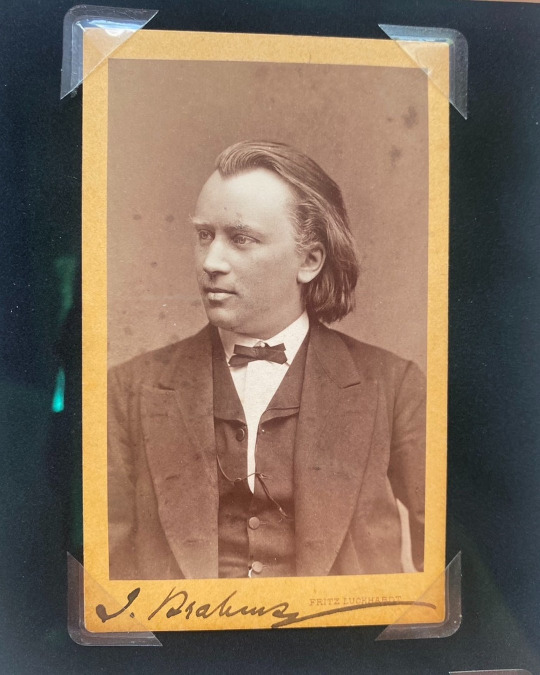
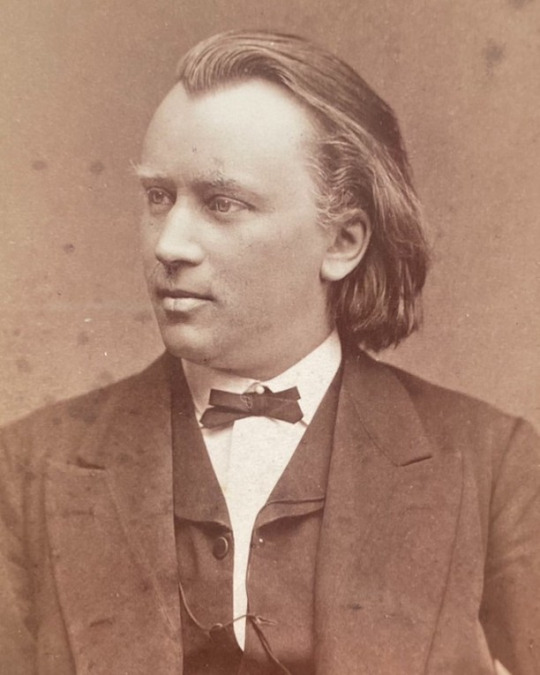
OTD in Music History: 45-year-old composer, conductor, and pianist Johannes Brahms (1833 – 1897) shocks the Viennese musical world of 1878 by revealing the famous big bushy beard that he will sport for the rest of his life.
Having always been clean-shaven up to that point, Brahms warned one friend in advance of the big reveal: "I am coming [to the concert] with a large beard! Prepare your wife for a most awful sight.”
Singer George Henschel (1850 – 1934) recalled what happened that night:
"I saw a man who was unknown to me, rather stout, of middle height, and with long hair and a full beard, approaching... In a very deep and hoarse voice, he gravely introduced himself as 'Musikdirektor Muller from Braunschweig.' ... An instant later, we all found ourselves laughing heartily at the perfect success of Brahms's disguise.”
Brahms was a notorious practical joker, and he must have savored the confusion he had caused. Even better, not everyone caught on so quickly – his good friend, the noted Beethoven scholar Gustav Nottebohm (1817 – 1892), apparently spent a whole evening conversing earnestly with ‘Kapellmeister Muller.’
Poor Nottebohm was also the target of one of Brahms’s most infamous practical jokes. Once, on a scrap of old music paper that he had procured, Brahms jotted down a then-current pop tune in an expert imitation of Beethoven’s musical handwriting (Brahms was an autograph collector) and bribed a local street vendor to wrap the manuscript around a sausage and sell it to Nottebohm. Brahms then arranged to be with him when this exchange occurred, and he was delighted to see the old pedant unwrap the sausage, step under a streetlight to furtively examine the paper (with his eyes popping out), and then slip it into his pocket and finish eating the greasy sausage, barehanded…
PICTURED: A copy of one of the last photos taken of the beardless Brahms, which he signed on the front with an inscription on the back that is actually dated to the year *after* he unveiled his beard.
#Johannes Brahms#Brahms#composer#classical composer#pianist#classical piano#classical pianist#piano#conductor#Romantic period#romantic era#Hungarian Dances#opera#classical music#music history#bel canto#aria#classical studies#classical musician#classical musicians#classical history#classical voice#concerto#concert#musician#musicians#history of music#historian of music#diva#prima donna
29 notes
·
View notes
Text
Made A New AU Where Henry Has Royal Blood In Him!!!!1!1!1!1!1
(May contain nerdy shit such as history, alternative history, blood heritage, and more)
Since the AU where Henry belongs to a family of Austrian nobility got a majority in the poll I made, I'm pleased to introduce to you all the "Königlich/Royal AU"!!!!!!1!1!1!1!1 This THSC AU explores stuff from the family members of Henry and the House of Stickmin/Stickmensch, both dead and alive from the time of Otto I in the 10th Century where the Stickmensch once ruled over the Duchy of Carinthia (located in Carinthia, Modern Day Austria) to the present day with Henry Stickmin and his remaining family members in Austria to other semi-domestic shenanigans Henry does that are based on either the Capital Gains, Pardoned Pals, Triple Threat, or the Stickmin Space Resort ending.

Some Info About The AU:
Coat of Arms of the House of Stickmin/Stickmensch:

The Stickmensch are divided into two branches:
1. "Edelweiss" Branch/Stickmensch-Österreich - Descendant of family members who stayed in Austria after WW1 or returned from self-imposed exile, they are distant relatives of Henry. There are a 12 members left in this branch where Henry's distant cousin, Karl Joachim Stickmensch, a Kapellmeister of the Militärmusik Kärnten is the head of the Edelweiss branch.
2. "Rose" Branch/Stickmensch-Amerika (Stickmin) - Descendants of Margrave Ludwig who fled to America along with some family members after the collapse of Austria-Hungary to avoid the instability and chaos, they are the Americanized part of the family who have adopted the American way of life while still holding on to some of the traditions of the old. Henry is the only living member and the head of the American branch (yes, he's still the same funny kleptomaniac who tends to steal things for himself and gets imprisoned). Alternatively, Ellie Rose can become a member of the branch as Henry's spouse which is both approved and pushed on by the Austrian branch of the family in order to continue Henry's bloodline.
This AU was inspired by the Crusader Kings franchise, history of the Holy Roman Empire and the Habsburg Monarchy, and the song "Kärntner Liedermarsch"
Took a long ass time (literally started making this after posting the poll and finished yesterday) to make the basis of the lore and concept for this AU so please consider liking n share this blog. Thank you
#the henry stickmin collection#thsc#henry stickmin collection#henry stickmin#thsc au#the henry stickmin au#königlich au#thsc henry stickmin#ellie rose#henry stickmin au
7 notes
·
View notes
Text
Ardagger - Frühstücksnews - Mittwoch, 3. Mai 2023
Sehr geehrte Gemeindebürgerin! Sehr geehrter Gemeindebürger! Zunächst darf ich heute am Mittwoch Herrn Alois Gruber aus Kollmitzberg ganz ganz herzlich gratulieren. Er hat bereits am Montag dieser Woche im Kreis seiner Familie seinen 90. Geburtstag gefeiert und ich darf hier nochmals DANKE sagen, dass er in seiner “Aktivzeit” einer der Gründerväter des Musikvereines Kollmitzberg war und der Musik…

View On WordPress
#Alois Gruber#Ausschreibung#Christian Huber#Daniel Dettling#Donaubrücke#Einsatzübung#Ensemleleiterausbildung#Feuerlöscherüberprüfung#FF Ardagger Markt#Froschauer#Geschäftsführung#gesunde Gemeinde#Gesunde Kleinregion#Haussammlung#Kapellmeister#Kofpweide#Michaela Schmutz#Mostbirnhaus#Musikverein Kollmitzberg#Naturland NÖ#Neustadtl#Personalsuche#positives Bild der Zukunft#Regionalstadl#Sammeln#Tiefenbach
0 notes
Note
🏳️🌈 🤷 and ‼️ for Tsizilia!
TY for the ask YIPPEEE
(Tsizzy my beloved)
Link to the game!
🏳️🌈: What is your self-insert’s gender identity? What’s their sexuality? Are they the same as yours irl?
Tsizilia is a cis-woman! (but a butch girl! She likes to identify/dress as masculine! [she even did top surgery bc she hated her boobs🤯]) She's also Bicurious (just like ME HEHE), but has a big preference for men.
[I do wanna dress more masc bc I like it, and I don't wanna get rid of my boobs. I just wanna wear a binder smh😞also I am honestly not sure for my gender, I'm having a bit of confusing times these months. But let's say genderqueer for now.]
🤷: What is your self-insert’s most mundane hobby?
Already answered here! ^^
‼️: What is your self-insert’s most extreme hobby?
Spreading villainous ideals, despair and corruption performing at concerts as either a kapellmeister/musician! And working out LMAO gotta keep that sexy physique mmmhm (Another one is discovering new reptile-like living beings! She adores reptiles, snakes the most :3)
#tysm for the ask <33333#👁🗨tsizilia⛓#ask box#tireddovahkiin answers#answered#ask game#ask meme#oc ask game#oc ask meme#self ship ask game#self insert oc
3 notes
·
View notes
Text



Maestro 💋
#mozart opera rock#mor#antonio salieri#salieri#mozart l'opera rock#mlor#cosplay#antonio salieri cosplay#mozalieri#salieri cosplay#kapellmeister salieri#mozart x salieri
68 notes
·
View notes
Text
modern AU where Salieri is a famous enough conductor and a teacher at music school who’s also secretly a big cars nerd and a drift king
salieri correctly predicts betting polls based on his observations and hearing
then someone insults him and he makes his opponent eat dust with his pro drifting (maybe with eurobeat for more fun) on Dantes’ expensive car only later to apologize for taking it on impulse while Edmond was supposed to be the one driving on their way to concert hall while Dantes nervously smokes his 5th cigarette being like ‘remind me to never insult his ability to drive okay—‘
#fate grand order#fgo#listen even as a servant Salieri having that knowledge#man channels his inner Initial D material#1999 shinjuku but it’s one tired Italian kapellmeister drifting hachiroku with eurobeat on background#he finds it extremely fun#master on passenger seat probably passed out#Edmond dying inside and jalter screaming her lungs out#considering 2/3 of Initial D eurobeat collection was made by Italian singers it’s even more hilarious
17 notes
·
View notes